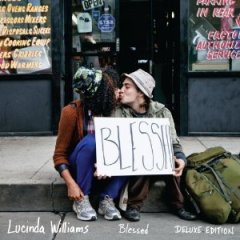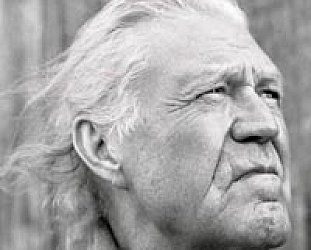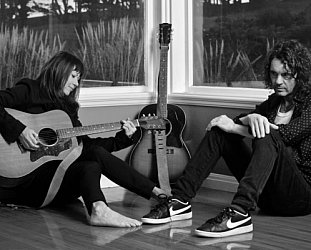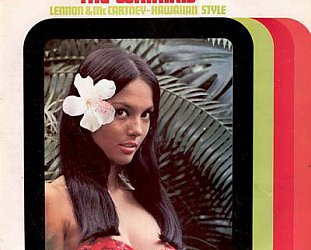Graham Reid | | 12 min read
Lucinda Williams (with Elvis Costello): Seeing Black

These are more good days for Lucinda
Williams: happily married and comfortable, a Grammy nomination for
Kiss Like Your Kiss (best song in a film or television series, it
appeared in True Blood) and acclaim from her peers, critics and an
increasing fan base.
And she has a new album out, Blessed
which was produced by Don Was, her husband Tom Overby and Eric
Leljestrand (the latter co-producing her previous album Little
Honey).
She may be in what she jokingly refers
to a “happy” place but there's ample evidence on Blessed -- which comes as a Deluxe Edition with her demos -- giving the lie to the notion that happy people can't make great art.
She bristles with rage on the scathing
opener Buttercup, delivers a beautiful but pained open letter to her
estranged brother (a sequel to Are You Alright? on her album West)
and on Seeing Black she offers up the often incoherent anger and
incomprehension we feel when someone close commits suicide. (“Did
you run out of places to go and hide?”)
Williams acknowledges her songs have
always had a cathartic quality, no more so than on Buttercup which
come with a slashing guitar part by Elvis Costello.
Yet Williams's songs are not all drawn
from her own life: Soldier's Song is an empathetic account of a
battlefield death and what goes through the young man's mind,
(“Baby's going to have to make a brand new start”). And in gentle
songs like Born to Be Loved, Sweet Love and the title track on
Blessed she reaches out to those hurting in America.
She spoke in January before embarking
on a tour with her album release still some weeks away.
Congratulations, you are up for another
Grammy. On a previous occasion when we spoke you were also up for
one. When I asked you about it and you said you would go because it
was a chance to meet up with old friends like Steve Earle who was
also nominated. And I see that Steve is again in the same category.
I think Steve and I have been in the
running at least three times. When I got the one for Car Wheels on a
Gravel Road he was nominated then, then there was another and I think
he won.
Will you go?
I don't know. The problem with these
things is they've cut back so much financially and the record label
used to cover a lot of the expenses. Now I get a ticket but I
probably have to buy my husband Tom a ticket. Before, [the record
company] Lost Highway would hire a car service and buy tickets for
everybody and provide and do hair and make-up for me, and clothes to
go.
But they don't do that anymore. Those
days are over. If want to get a car service . . . that's the easiest
way to do it because it's hard to drive yourself because of the
nightmare traffic.
I don't mean to sound ungrateful, but
it's hard to go when you don't win (laughs)
When I won for Passionate Kisses I
didn't go, and then when I won for Car Wheels I was there and for Get
Right With God I was there. But I went one year when I had several
nominations and I didn't win anything.
And you still have to smile and applaud
in case the camera is on you.
Yeah. I was talking with John Prine about it and he doesn't like to go. He says he'd rather sit in his hotel room and watch it on TV. Every time he went he didn't win, and when he didn't go he won.
[Note: At the Grammys a fortnight later neither Williams nor Earle won in their category, it went to Ryan Bingham for his song The Weary Kind in the film Crazy Heart]
 I see you are out on the road again.
I see you are out on the road again.
Our first date is Feb 18 in Iowa and
we're going to make our way through the Midwest up to New York and
end up at SXSW in Austin, so we'll be out for about four weeks.
You would have a broad audience base in
the Midwest I am guessing, that's not a place where a lot of people
go?
I guess it depends on your fan base.
There are certain areas in the Midwest that are really strong, like
Minneapolis is a big music town. And there are a lot of college
towns and that's usually where you end up going. Like we're going to
be in Ann Arbor because that's a big college town and that sold out
in a day.
I'm doing a bunch of these shows just
solo and make my way up to Toronto and the band's going to join me
there and we'll do two shows with Levon Helm. Then the rest of the
tour will be with the band.
Tom and I were visiting with my dad in
Arkansas in October and we did a couple of spontaneous solo shows in
Fayetteville. which is a college town and it was great. It sold out
out. I did two nights and I probably could have done five. The place
held about 500 and I hadn't played there for so long.
It must be gratifying to play in
college town and pull a younger audience than your peers.
Right. It is. And it's always been like
that and it has just grown, pulling in that younger audience. I have
younger people who will tell me their parents brought them to see me
when they were kids because their parents were my age. It's cool to
see how it crosses over into the next generation.
My guess is that would be because your
songs are emotionally direct and on this new album even more so.
Before we discuss the songs . . . when I spoke to you about West I
asked you what [producer] Hal Willner brought to that project. I'm
interested to know what drew you to Don Was.
Yeah, needless to say Don was great, I
can't say enough about him. It was great to have another set of ears
and he's got such expertise. One of my favourite Rolling Stones
albums was one he did and it was Tom's idea to bring him.
We met during the Grammys for the
tribute to Neil Young and he was inducted and they asked me to
perform and Don was in the house band. I ended up singing one song
with Emmylou Harris and Patty Griffin. We were just hanging around
backstage and he knew about me and I knew about him and we just hit
it off.
Tom was there and picked up on the
chemistry and later we talking about bringing someone else in because
we didn't want to do the same album over again, although we had a
great team with Eric and Tom and me.
But there was an opportunity which
presented itself and we just wanted to try it out. So we had dinner
and a couple of meetings and listened to a lot of the albums he'd
done. I particular loved the later albums he did with Kris
Kristofferson, the simplicity and how the vocals are recorded – and
obviously he'd worked with a lot of different styles of music.
 And you too, because on this album
there are quiet, emotionally direct songs and some are angry and
raging rock'n'roll songs too. It seems that you are in a good place
in your life now – but this denies the cliché that happy people
can't make great art.
And you too, because on this album
there are quiet, emotionally direct songs and some are angry and
raging rock'n'roll songs too. It seems that you are in a good place
in your life now – but this denies the cliché that happy people
can't make great art.
Yeah, well there is no 100 percent
happy. Even if you fall in love and get married you are not running
around deliriously happy all the time. I'm affected by a lot of
different things in the world. I read the paper every day so a lot of
things are going to affect me.
I guess now I'm writing about a lot of
different things, which has really been liberating. It was an
exercise to see if I can do it, but now it is just happening more
naturally for me.
Let's start with the really rowdy one:
Buttercup which first up.
Yeah, it's about the same guy I wrote
Jailhouse Tears about, so it's the last chapter of that. As I tell
people when I play it live, 'This is the only bad boy song on the new
album' and they all laugh. I still had a little in my system I had to
get out.
It has that seething anger I recall
from Dylan's Positively Fourth Street – which you of course have
covered – but we don't hear much of these days.
Exactly.
Seeing Black? You are asking the
questions we all have when something like that happens, that anger,
the incoherent rage we have with suicides.
What spawned the song was when Vic
Chesnutt took his life. It was one of those things where you just go
'What? My God!' I'd always dealt with the subject but I was just …
Did you know him well?
I didn't know him real well but I had
known him a long time and we were fans of each others stuff. I'd ben
to some of his shows and we'd met and hung out. When I was first
starting out I met him in Athens, he was part of our community, our
world. One of our own.
One of the most beautiful songs is I
Don't Where You're Living . . . and it is a sequel to Are You
Alright?
Exactly. It's my brother again.
This is an open letter to him.
That's a beautiful way of putting it.
Has he ever responded, after the last
song?
No, I haven't heard from him, he
doesn't reach out. It's sad, that's how he wants it that way right
now. It's not an anger.
Copenhagen deals with something
personal too.
Yeah Frank, my ex-manager Frank
Carrali. We were in Copenhagen when we heard of his death. The song
is very literal. I'm, proud of that one, lyrically. It was snowing a
little bit and we had the night off and found out about it. Tom and I
and our tour manager at the time walked down the street from the
hotel and went to a bar and I ended up talking to these people all
night, drinking and crying and trying to deal with the suddenness of
it.
Songs are cathartic for you?
I've always approached songwriting that
way but maybe these are even more obviously so. Maybe as you get
older the losses are greater, you lose more. Obviously the longer you
live the more losses you will have.
But you lose the memory, the longer
memory of Vic Chestnut. When you are 18 and a friend dies you only
knew them for a couple of years, but with someone like Vic you are
talking decades of memories together.
Yeah.
 I've always felt a very sympathetic
element in your songs. Here on the title track and Soldier's Song.
I'm mindful that America is a nation at war – but Ugly Truth is
another where you have an empathy for characters.
I've always felt a very sympathetic
element in your songs. Here on the title track and Soldier's Song.
I'm mindful that America is a nation at war – but Ugly Truth is
another where you have an empathy for characters.
Exactly! You're really good! I've done
that in songs like Sweet Old World and Drunken Angel. As a writer I
feel I have to understand what that person is feeling in order to be
able to write about it. There were two songs where I learned about
being empathetic. One was Drunken Angel and the other was Lake
Charles [both on Car Wheels on a Gravel Road]. It was very difficult
when I was writing those songs because I didn't want it to be like I
was pointing the finger or scolding, even though that's how I was
feeling. So I had to get my point across while being empathetic and
that was quite a challenge. That has been my main goal when I am
writing about other people.
In Soldier's Song it strikes me that
you've clicked on that thing which we don't get when we are young and
angry about war -- and I'm old enough to remember the Vietnam era and
the demonstrations – and that is that the soldier is the victim as
much as anybody.
Exactly, and this is a different war
and a different time. I decided to take a different approach. I've
thought and wondered how would it feel to be a soldier. Because not
all of them over there are these big gung-ho
hey-let's-go-kill-somebody types. A lot are just these kids who've
ended up over there.
I'm still angry but it's pointless to
point the finger at soldiers – and I think a lot of that came from
after the Vietnam war and the Vietnam veterans who came back and
became anti-war activist.
I know Bobby Muller who is the head of
the Vietnam Veterans organisation in America and he was a platoon
leader and was wounded and is in a wheelchair now. He was one of
those people who spearheaded the abolish the landmines movement, and
that expanded my view of things over the last 40 years.
This is encouraging, many people narrow
their view.
Yeah! I read in the paper yesterday
about the new governor of Alabama who is this Christian, a Baptist,
and basically he said if you were a Christian you were were his
brother or sister – but only if you were a Christian. 'So I
encourage you to become a Christian so we can all be brothers and
sisters.' The governor of Alabama? It's like we're going backwards!
It reminded me of George Wallace.
But even he retracted some of the
positions that he had held and admitted he was wrong.
Yeah. I got it wrong – and now look.
This is the great schism that America
is facing, this increasing schism: the Fox Network versus everybody
else if you want to be blunt.
Oh yeah.
These are difficult times.
Very difficult.
When you are on the road and meeting
people you are probably encountering like-minded people, but what is
your sense of America today. Are people optimistic?
People are angry and concerned. People are losing patience and are confused and looking for an answer. And if you start talking about Sarah Palin for instance there is all the rhetoric – but there is the sense that nothing is changing and nothing seems to work. I still love Obama and still believe in him and feel he got the short end of the stick. He got blamed for so much.
Lucinda William's album Blessed comes as a standard CD and as a special edition with a bonus disc of her acoustic demos. To buy the standard CD go here, to buy the special edition call your nearest JB Hi-FI store here. Post free within New Zealand.
There is an earlier interview with Lucinda Williams about her album West at Elsewhere here.







post a comment